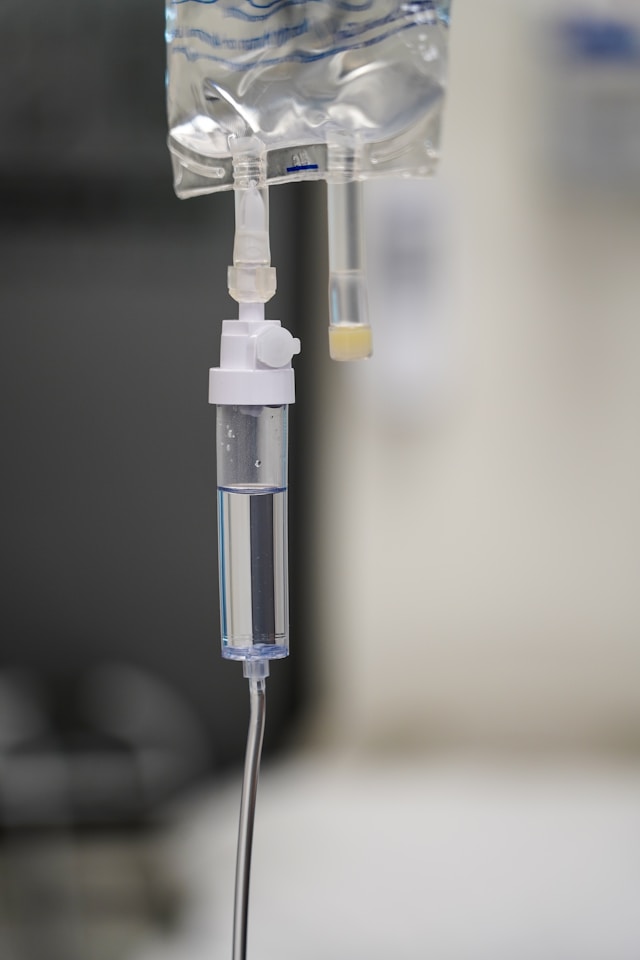
Infusion Therapy for Ulcerative Colitis


Dr. Chen is a board-certified immunologist with over 15 years of experience treating autoimmune and immunodeficiency disorders. She specializes in IVIG therapy and has published extensively on immune system treatments.
Medical Disclaimer
Ulcerative colitis (UC) is a chronic inflammatory bowel disease that causes continuous inflammation and ulceration of the colon's innermost lining, leading to painful symptoms including bloody diarrhea, abdominal cramping, urgency, and fatigue. When oral medications like mesalamine or immunomodulators don't adequately control inflammation, infusion therapy offers powerful treatment options that can induce remission, heal the colon lining, and help patients avoid colectomy surgery. Understanding how infusion therapy works for ulcerative colitis helps you make informed decisions about managing this challenging condition.
Key Highlights
- Biologic infusion therapies for UC target specific inflammatory proteins and immune pathways, achieving better disease control than conventional medications alone for many patients.
- Common infusion medications include Remicade, Entyvio, and Inflectra/Renflexis, typically given every 8 weeks after loading doses.
- Many UC patients achieve clinical and endoscopic remission with infusion therapy, experiencing relief from bloody diarrhea, urgency, and abdominal pain while allowing colon healing.
Understanding Ulcerative Colitis
Ulcerative colitis is an autoimmune condition where your immune system attacks the lining of your colon (large intestine) and rectum, causing chronic inflammation. Unlike Crohn's disease which can affect any part of the digestive tract, UC is limited to the colon and always involves the rectum, spreading continuously without healthy patches.
Symptoms include frequent bloody diarrhea, urgent need to defecate, abdominal pain and cramping, tenesmus (feeling of incomplete evacuation), fatigue, weight loss, and fever during flares. Disease extent varies from proctitis (rectum only) to left-sided colitis to pancolitis (entire colon).
According to the Crohn's & Colitis Foundation, approximately 907,000 Americans have ulcerative colitis. It typically develops between ages 15-30 or 50-70, affecting men and women equally. Family history and genetic factors increase risk.
Left uncontrolled, UC can lead to severe complications including toxic megacolon, colon perforation, severe bleeding, and increased colon cancer risk. Chronic inflammation also causes anemia, malnutrition, and significantly impairs quality of life. Achieving deep remission with mucosal healing helps prevent these complications.
Why Infusion Therapy for Ulcerative Colitis
Infusion therapy becomes appropriate for UC in several scenarios:
Moderate to Severe Disease: Patients with extensive inflammation, frequent bloody stools, significant symptoms, or complications need the stronger anti-inflammatory effects biologics provide.
Failure of Conventional Therapy: When 5-ASA medications (mesalamine, sulfasalazine), oral corticosteroids, or immunomodulators (azathioprine, 6-MP) don't induce or maintain remission, biologic infusions offer more targeted treatment.
Steroid Dependency or Refractoriness: Patients requiring continuous steroids to control disease or whose UC doesn't respond to steroids need alternative therapy. Biologics can achieve steroid-free remission.
Preventing Colectomy: Effective biologic therapy can help patients avoid colon removal surgery (colectomy) or delay it indefinitely by achieving disease control.
Acute Severe UC: During severe flares, IV biologics can sometimes prevent emergency colectomy when high-dose IV steroids fail.
Quality of Life Impact: When UC symptoms significantly impair work, social activities, or daily function despite conventional treatment, biologics can provide relief.
The American Gastroenterological Association recommends biologic therapy for UC patients with moderate to severe disease or inadequate response to conventional treatments.
Common Infusion Medications for Ulcerative Colitis
Remicade (Infliximab): A TNF-alpha inhibitor blocking a key inflammatory protein. The most established biologic for UC with extensive long-term safety data. Given every 8 weeks after loading doses at weeks 0, 2, and 6. Infusions take 2-3 hours initially. Can induce rapid remission, sometimes within 2-4 weeks. According to the Mayo Clinic, Remicade induces remission in about 60-70% of UC patients.
Entyvio (Vedolizumab): A gut-selective integrin blocker preventing inflammatory cells from entering intestinal tissue. Because it works only in the GI tract (not systemically), Entyvio may have fewer systemic side effects than TNF inhibitors. Given every 8 weeks after loading doses. Infusions take about 30 minutes. May take longer to show benefit (up to 14 weeks) but excellent for maintaining remission. Many gastroenterologists prefer Entyvio as first-line biologic for UC due to its gut selectivity and safety profile.
Inflectra and Renflexis: Biosimilar versions of Remicade that work identically but may cost less. Given on same schedule as Remicade.
Simponi (Golimumab): While the IV form (Simponi Aria) is used for other conditions, Simponi for UC is given as self-injection after initial doses. Some infusion centers may give the first dose by infusion.
What to Expect from Infusion Therapy
Pre-Treatment Evaluation: Before starting biologics, you'll need tuberculosis screening, hepatitis testing, baseline labs (complete blood count, liver function, inflammatory markers), and assessment of disease extent/severity through colonoscopy.
Loading Dose Schedule: Most UC biologics use loading doses to achieve therapeutic levels quickly. Remicade is given at weeks 0, 2, and 6, then every 8 weeks. Entyvio follows a similar pattern.
Timeline for Improvement: TNF inhibitors like Remicade often show benefit within 2-4 weeks, with many UC patients experiencing reduced bleeding and bowel frequency after just 1-2 infusions. Entyvio may take longer—8-14 weeks—to show maximum benefit. Mucosal healing (confirmed by colonoscopy) typically takes 3-6 months to achieve.
Combination Therapy: Some UC patients continue taking 5-ASA medications or immunomodulators along with biologics, though combination therapy is less common in UC than Crohn's disease.
Monitoring Response: Your gastroenterologist tracks improvement through symptom diaries, inflammatory markers (CRP, fecal calprotectin), and colonoscopy to assess mucosal healing—the goal of UC treatment.
Benefits of Infusion Therapy for UC
Patients responding well to biologic infusions often experience:
Clinical Remission: Dramatic reduction or elimination of bloody diarrhea, abdominal pain, urgency, and other UC symptoms. Many patients return to 1-2 normal, formed bowel movements daily.
Mucosal Healing: Resolution of inflammation and ulceration visible on colonoscopy. Achieving mucosal healing correlates with sustained remission and reduced cancer risk.
Steroid-Free Remission: Ability to discontinue prednisone while maintaining disease control, avoiding serious long-term steroid complications.
Reduced Hospitalizations: Fewer severe flares requiring hospitalization or emergency treatment.
Avoidance of Colectomy: Many patients who might otherwise need colon removal surgery can maintain their colon with effective biologic therapy.
Improved Quality of Life: Relief from constant bathroom urgency, pain, and bleeding allows return to work, social activities, travel, and normal daily life.
Reduced Anemia: As colon bleeding resolves, anemia improves and energy increases.
Better Nutritional Status: Reduced inflammation allows better nutrient absorption and improved overall health.
Decreased Cancer Risk: Achieving and maintaining mucosal healing reduces the elevated colon cancer risk associated with chronic UC inflammation.
The National Institute of Diabetes and Digestive and Kidney Diseases emphasizes that achieving deep remission with biologics provides the best long-term outcomes for UC patients.
Potential Side Effects and Risks
Increased Infection Risk: All biologics suppress immune function, making infections more common. Upper respiratory infections, urinary tract infections, and skin infections occur more frequently. Serious infections requiring hospitalization affect a small percentage of patients.
Infusion Reactions: Acute reactions during or shortly after infusion can include headache, nausea, rash, itching, flushing, or shortness of breath. Usually mild and managed with pre-medications and slower infusion rates. Severe reactions are rare.
Tuberculosis Reactivation: Latent TB can reactivate with biologic therapy, particularly TNF inhibitors. Screening before treatment and preventive antibiotics if positive are essential.
Liver Enzyme Elevations: Some patients develop elevated liver enzymes, requiring monitoring through regular blood tests.
Antibody Development: Some patients develop antibodies against biologics (particularly Remicade without immunomodulator combination), reducing effectiveness or increasing reaction risk.
Paradoxical Reactions: Rarely, TNF inhibitors can trigger new autoimmune-type conditions like psoriasis or arthritis.
Malignancy Concerns: Some studies suggest small increased risk of certain cancers with long-term biologic use, though absolute risk remains low and must be weighed against UC benefits.
Entyvio-Specific Considerations: Because Entyvio is gut-selective, it has fewer systemic side effects than TNF inhibitors but may be less effective for extraintestinal manifestations (arthritis, skin symptoms) if present.
Your gastroenterologist monitors for issues through regular appointments, symptom assessment, and laboratory testing.
Living with UC on Infusion Therapy
Infection Prevention: Practice careful hand hygiene, avoid sick contacts when possible, stay current on vaccinations (no live vaccines while immunosuppressed), report fevers or unusual infections promptly.
Treatment Adherence: Keep infusion appointments consistently. Missing doses can trigger flares and may increase antibody development risk with some biologics.
Symptom Monitoring: Track bowel movements, bleeding, pain, and urgency. Share detailed symptom information with your gastroenterologist to assess treatment response.
Dietary Considerations: While diet doesn't cause UC, certain foods may worsen symptoms during flares. Work with a dietitian if needed to ensure adequate nutrition while managing trigger foods.
Stress Management: While stress doesn't cause UC, many patients find stress worsens symptoms. Stress reduction techniques may help manage disease alongside medical treatment.
Regular Follow-Up: Maintain scheduled appointments, complete recommended lab work, and undergo surveillance colonoscopy as recommended (frequency depends on disease extent and duration).
Cost and Insurance Considerations
UC biologics are expensive, but financial assistance programs make them accessible:
Insurance Coverage: Most plans cover FDA-approved biologics for UC with prior authorization demonstrating inadequate response to conventional therapy.
Copay Assistance: Manufacturers offer copay cards reducing costs to minimal amounts ($0-50 per infusion) for insured patients.
Patient Assistance Programs: Free or discounted medication for uninsured/underinsured patients meeting income criteria.
Foundation Support: Crohn's & Colitis Foundation helps connect patients with financial resources and assistance programs.
Frequently Asked Questions
How effective is infusion therapy for ulcerative colitis?
Infusion biologics are highly effective for UC. Remicade induces remission in about 60-70% of patients, with many maintaining remission long-term. Entyvio achieves remission in approximately 40-50% of patients with even better maintenance rates. Many patients who don't respond to one biologic achieve remission with a different one. Biologics represent the most effective medical treatments for moderate to severe UC and have helped countless patients avoid colectomy surgery.
How quickly does infusion therapy work for UC?
TNF inhibitors like Remicade often show benefit rapidly—many UC patients notice reduced bleeding and improved bowel movements within 2-4 weeks. Some patients experience dramatic improvement after just one or two infusions. Entyvio typically takes longer, with full benefit often requiring 8-14 weeks. Mucosal healing (confirmed by colonoscopy) generally takes 3-6 months to achieve with any biologic. If you see no improvement by 12-14 weeks, your doctor may consider switching biologics.
Can infusion therapy prevent colon removal surgery?
Yes, for many UC patients, effective biologic therapy allows them to keep their colon and avoid colectomy. Studies show that early aggressive treatment with biologics reduces colectomy rates. However, some patients with severe disease, medication-refractory symptoms, precancerous changes, or serious complications may still require surgery despite biologics. The goal is using biologics to achieve deep remission and preserve your colon, which is successful for the majority of patients.
Do you need to stay on UC infusion therapy forever?
Most UC patients require ongoing maintenance biologic therapy to sustain remission. Stopping biologics typically leads to disease flare within months. UC is a chronic condition requiring long-term treatment to prevent relapse. Some patients who achieve very prolonged deep remission (multiple years of mucosal healing) may attempt treatment withdrawal under close monitoring, but this carries high relapse risk and is uncommon. Most patients continue maintenance infusions indefinitely.
What if Remicade or Entyvio stops working for my UC?
Loss of response can occur due to antibody development or other mechanisms. Options include increasing dose or frequency, switching to a different biologic class (from TNF inhibitor to integrin blocker or vice versa), adding an immunomodulator to reduce antibodies, or trying newer UC therapies. Multiple effective biologics are now available for UC, so alternatives exist if one loses effectiveness. Your gastroenterologist will determine the best approach based on why response was lost.
Taking Control of Your UC
Being prescribed infusion therapy for ulcerative colitis represents access to powerful treatments that have transformed outcomes for countless patients. While UC remains a chronic condition requiring ongoing management, modern biologic therapies allow many patients to achieve and maintain remission, heal their colon, and live normal lives without constant urgency and bleeding.
With proper treatment and monitoring, avoiding colectomy and living well with UC is achievable for most patients.
Ready to explore infusion therapy options for your ulcerative colitis? Find infusion centers experienced in IBD treatment near you to begin your journey toward remission.
Medical Disclaimer: This content is for educational purposes only and is not a substitute for professional medical advice, diagnosis, or treatment. Always consult your healthcare provider with questions about your medical condition or treatment options.
Article Statistics


Table of Contents
Article Statistics










